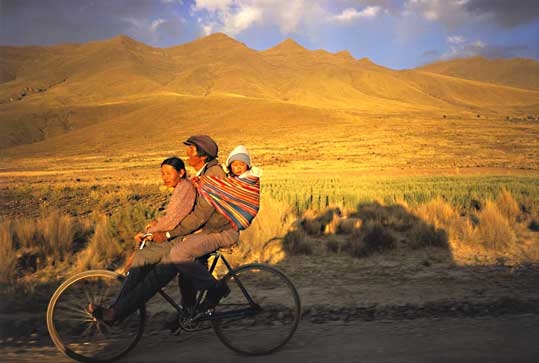Bolivia: Tiny Nation, Big Troubles

Picture font: Jacob Holdt www.american-pictures.com/ dansk/care/care.htm
Source:
This commentary was originally published by The Christian Science Monitor, on June 9, 2005.
The Monitor's View
Corruption. Weak democracy. These two enduring problems help account for the lack of economic opportunity for Bolivia's poor masses. They also explain why that country is on the verge of tipping left - mirroring a trend by six other Latin American nations in the past three years.
But another big issue at play needs to be more openly addressed, and that's racism.
The protests in the capital, La Páz, that this week forced Bolivia's president to offer his resignation and warn of civil war, are led largely by indigenous people. Making up at least 65 percent of the population, these subsistence farmers and miners live mostly in poverty.
Like other Latin American indigenous groups, they've gained political clout in recent years. With that, they want a larger share of the economy, especially from Bolivia's natural gas reserves - the second largest in the Southern Hemisphere.
In some ways, the situation resembles that of South Africa as it emerged from apartheid, says Donna Lee Van Cott, a Tulane University expert on Latin American ethnic politics. Bolivia's European and mixed-race elites "are absolutely horrified by the gains the indigenous have made."
Racism is moving from the subsurface into the open, Ms. Van Cott says. She points to recent cases of light-skinned youths harassing Indian protesters and yelling racial slurs, and protesters pulling neckties from people, calling them "white men."
Racism in Latin America as a whole goes back centuries to the Spanish conquest. But in the past decade, coinciding with the 500th anniversary of Columbus's discovery, indigenous groups have asserted themselves. Many countries, including Bolivia, rewrote their constitutions to recognize indigenous culture and rights. Native people formed political parties and entered government.
As they've gained power, however, there's been a backlash. Forced by extreme poverty to take extreme positions, Indians in countries like Ecuador and Bolivia have adopted socialist, sometimes militant, ideology, demanding their governments nationalize the oil and gas industries.
In Bolivia, that's leading to schism. The fair-skinned, economically advantaged people who live in the lowlands want autonomy. They reject Indian socialist extremism, as they should.
The Bolivian budget also supports mostly white, elite institutions and people, while Indians rely largely on charities and foreign aid. One Indian demand is to take part in writing a new constitution. The constitutional reform of the '90s, though benefitting Indians, was done by the elites. It's only fair a document defining a country should include the majority voice.
Though many other steps, including a trusted mediator, would help calm the situation in Bolivia, this one, it seems, could go a long way in getting at the racism issue.
Christian Science Monitor is an international daily newspaper published Monday through Friday, since 1909.

<< Home